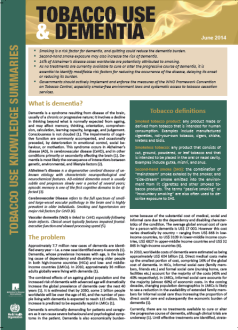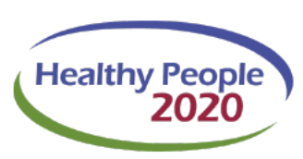| New WHO Brief Shows Link between Tobacco Use and Dementia
 In a review of existing evidence, a new brief from the World Health Organization (WHO) found a strong link between smoking and the risk of dementia, with heavier smokers having an even greater risk. It has been estimated that approximately 14 percent of dementia cases worldwide – and 11 percent in the United States – are potentially attributable to smoking. According to the WHO report, research also suggests that for current smokers, quitting smoking might be beneficial in reducing the risk of dementia. This report underscores the need for public health officials to integrate Alzheimer’s messages into existing public health campaigns, such as anti-smoking efforts. In a review of existing evidence, a new brief from the World Health Organization (WHO) found a strong link between smoking and the risk of dementia, with heavier smokers having an even greater risk. It has been estimated that approximately 14 percent of dementia cases worldwide – and 11 percent in the United States – are potentially attributable to smoking. According to the WHO report, research also suggests that for current smokers, quitting smoking might be beneficial in reducing the risk of dementia. This report underscores the need for public health officials to integrate Alzheimer’s messages into existing public health campaigns, such as anti-smoking efforts.
The Public Health Road Map, released last year by the Centers for Disease Control and Prevention (CDC) and the Alzheimer’s Association, provides actions the public health community can take to address the Alzheimer’s crisis, including dissemination of evidence-based messages about risk reduction (Action Item E-04).
Healthy People 2020 Reports Improvements in Seniors’ Health
 A June 2014 Healthy People 2020 progress review reported improvement in nearly half the objectives targeting older adults, including areas important to brain health. Healthy People 2020 set 10-year national goals designed to improve the nation’s health and for the first time, the initiative includes older adults and dementia as separate topic areas. Among the highlights of the progress review were an increase in physical activity among seniors – increased physical activity has been shown to reduce the risk of cognitive decline – and a decline in the number of adults aged 65 and older with moderate to severe functional limitations. A June 2014 Healthy People 2020 progress review reported improvement in nearly half the objectives targeting older adults, including areas important to brain health. Healthy People 2020 set 10-year national goals designed to improve the nation’s health and for the first time, the initiative includes older adults and dementia as separate topic areas. Among the highlights of the progress review were an increase in physical activity among seniors – increased physical activity has been shown to reduce the risk of cognitive decline – and a decline in the number of adults aged 65 and older with moderate to severe functional limitations.
Although not yet posted to the Healthy People 2020 website, new national baseline data for the two objectives in the “Dementias, including Alzheimer’s Disease” topic area were also announced during the progress review. For the first objective on diagnosis, the baseline measure shows only 34.8 percent of seniors with a dementia diagnosis, or their caregiver, were aware of the diagnosis. For the second objective on preventable hospitalizations, the data show 25.3 percent of older adults with a dementia diagnosis had a preventable hospitalization. The target for both objectives is a 10 percent improvement by 2020.
You can view the PowerPoint slides from, and read a transcript of, the June 2014 older adults progress review webinar here.
ASTHO Releases New Brief on Supporting Caregiverse
 Given the large role that family and friends play in providing unpaid care to individuals with Alzheimer’s and other dementias, addressing the needs of caregivers is a key element in the Public Health Road Map. To help state and local public health officials provide support to caregivers, the Association of State and Territorial Health Officials (ASTHO) recently released an Issue Brief and case studies from California, Georgia, and Maine. Given the large role that family and friends play in providing unpaid care to individuals with Alzheimer’s and other dementias, addressing the needs of caregivers is a key element in the Public Health Road Map. To help state and local public health officials provide support to caregivers, the Association of State and Territorial Health Officials (ASTHO) recently released an Issue Brief and case studies from California, Georgia, and Maine.
In these papers, ASTHO identified how public health currently supports caregiving initiatives and provides recommendations, best practices, and lessons learned. Specifically, ASTHO recommends convening statewide partners with diverse representation, strengthening the capacity of the paid caregiving workforce, and identifying models of sustainability.
September is National Preparedness Month!
 September is National Preparedness Month and the Centers for Disease Control and Prevention (CDC), along with over 3,000 organizations across the country, are teaming up to encourage Americans to be prepared in case of an emergency. During the month, each week will have a different focus, and older adults will be featured during the week of September 14. The CDC will release senior-specific messaging, informational graphics, blog posts, and a mobile application aimed at the specific needs and limitations of older adults and the importance of keeping specialized items ready in case they are needed during an emergency or natural disaster. September is National Preparedness Month and the Centers for Disease Control and Prevention (CDC), along with over 3,000 organizations across the country, are teaming up to encourage Americans to be prepared in case of an emergency. During the month, each week will have a different focus, and older adults will be featured during the week of September 14. The CDC will release senior-specific messaging, informational graphics, blog posts, and a mobile application aimed at the specific needs and limitations of older adults and the importance of keeping specialized items ready in case they are needed during an emergency or natural disaster.
Those with Alzheimer’s disease and other dementias are particularly vulnerable during emergencies and need special consideration to keep them safe. National Preparedness Month gives the public health community a prime opportunity to include those living with Alzheimer’s into their state and local emergency preparedness plans (Road Map Action Item P-02).
Vitamin D Deficiency Linked to Increased Risk of Alzheimer’s and Dementia
 Seniors with a severe vitamin D deficiency had more than twice the risk of developing Alzheimer’s disease and dementia than those with normal vitamin D intake, according to a new study. Among those with low – but not deficient – levels of vitamin D, the risk for Alzheimer’s increased 69 percent. The observational study looked at the health data of over 1,600 U.S. adults over the age of 65 for a period of about 6 years. It confirms earlier studies showing an association between low levels of vitamin D and an increased risk for Alzheimer’s disease and other dementias. Seniors with a severe vitamin D deficiency had more than twice the risk of developing Alzheimer’s disease and dementia than those with normal vitamin D intake, according to a new study. Among those with low – but not deficient – levels of vitamin D, the risk for Alzheimer’s increased 69 percent. The observational study looked at the health data of over 1,600 U.S. adults over the age of 65 for a period of about 6 years. It confirms earlier studies showing an association between low levels of vitamin D and an increased risk for Alzheimer’s disease and other dementias.
The Alzheimer’s Public Health E-News is supported by Cooperative Agreement #5U58DP002945-04 from the Centers for Disease Control and Prevention (CDC). Its contents are solely the responsibility of the Alzheimer’s Association and do not necessarily represent the official views of the CDC.
|